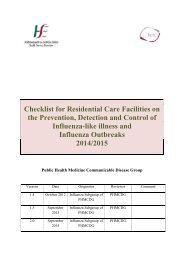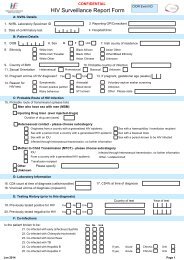VRE information leaflet for patients
VRE information leaflet for patients
VRE information leaflet for patients
Create successful ePaper yourself
Turn your PDF publications into a flip-book with our unique Google optimized e-Paper software.
<strong>VRE</strong><br />
Vancomycin<br />
Resistant<br />
Enterococci<br />
What is <strong>VRE</strong><br />
<strong>VRE</strong> are bugs (bacteria) that live in the bowel and<br />
that cannot be treated by certain antibiotics, such<br />
as vancomycin. <strong>VRE</strong> stands <strong>for</strong> Vancomycin Resistant<br />
Enterococci.<br />
Can <strong>VRE</strong> be harmful<br />
For most <strong>patients</strong>, <strong>VRE</strong> lives harmlessly in the bowel<br />
and does not cause infection. However, sometimes <strong>VRE</strong><br />
can cause infection in <strong>patients</strong>, <strong>for</strong> example when they<br />
need intensive care or while receiving chemotherapy.<br />
Antibiotics are needed to treat <strong>VRE</strong> infection. <strong>VRE</strong> can<br />
cause infections, such as kidney infections, wound<br />
infections or in severe cases, blood infection. If a<br />
patient is more vulnerable to infection and the infection<br />
is caused by <strong>VRE</strong>, it can be difficult to treat, because<br />
many of the commonly used antibiotics will not work<br />
against <strong>VRE</strong>. Doctors need to know as soon as possible<br />
if a patient is carrying <strong>VRE</strong> so that the most effective<br />
antibiotics can be chosen to treat the infection.<br />
How do people get <strong>VRE</strong><br />
Patients who have already taken lots of<br />
antibiotics are more at risk of picking up <strong>VRE</strong>.<br />
The reason <strong>for</strong> this is that the bugs are more<br />
exposed to antibiotics, and are there<strong>for</strong>e more<br />
likely to develop ‘resistance’ to that antibiotic, so that<br />
antibiotic no longer works.<br />
<strong>VRE</strong> can be carried by <strong>patients</strong>, healthcare staff or<br />
visitors, either harmlessly or if they are infected with it.<br />
It can spread between <strong>patients</strong> through direct contact<br />
with each other or by touching items or surfaces that<br />
the person with <strong>VRE</strong> may have touched, such as bed<br />
rails, toilets or equipment. As <strong>patients</strong> in hospital are much<br />
more vulnerable to infection than <strong>patients</strong> in their own<br />
homes, special precautions are required to prevent the<br />
spread of <strong>VRE</strong> between <strong>patients</strong> in hospital.<br />
What are the special precautions <strong>for</strong><br />
<strong>patients</strong> with <strong>VRE</strong><br />
Special precautions have been designed to prevent <strong>VRE</strong><br />
spreading between <strong>patients</strong> on the ward. If you have a<br />
positive test result <strong>for</strong> <strong>VRE</strong>, a careful check will be done to<br />
decide if you need to be cared <strong>for</strong> in an isolation room with<br />
your own toilet or commode. If <strong>VRE</strong> is picked up in a wound<br />
swab or from urine taken from a urinary catheter or if<br />
you have diarrhoea, you may be cared <strong>for</strong> in an<br />
isolation room.<br />
<strong>VRE</strong> does not cause diarrhoea but because it<br />
lives in the bowel, it may be spread more<br />
easily if you are suffering with diarrhoea.<br />
Staff will wear gloves and aprons be<strong>for</strong>e<br />
coming into contact with you, to protect their<br />
hands and clothes from <strong>VRE</strong>. Patients, staff<br />
and visitors must pay special attention to hand<br />
hygiene. All staff must clean their hands be<strong>for</strong>e<br />
and after any contact with every patient, regardless of<br />
whether or not they have <strong>VRE</strong>. If visitors are helping<br />
out with your physical care, nursing staff will advise<br />
if extra precautions are required, such as wearing<br />
gloves and aprons.<br />
How can I help<br />
If you go to the doctor, another clinic, hospital or nursing<br />
home, let them know you have had a positive <strong>VRE</strong> result.<br />
They can then take special precautions to stop <strong>VRE</strong> spreading<br />
to other <strong>patients</strong> who might be more prone to getting a <strong>VRE</strong><br />
infection.<br />
What happens when I’m ready to leave<br />
hospital<br />
You can go home as soon as your doctor says you are<br />
ready, even if you have <strong>VRE</strong>. Carrying <strong>VRE</strong> will not affect<br />
your discharge. If you are going to another hospital or<br />
nursing home, your nurse or doctor will let them know<br />
about your positive <strong>VRE</strong> result so that they can take<br />
measures to prevent it spreading to other <strong>patients</strong>.<br />
What happens when I go home<br />
There is no need to take special precautions at home.<br />
People in the community are usually fit and healthy<br />
so they are less likely than hospital <strong>patients</strong> to<br />
pick up <strong>VRE</strong>. Clothes, bed linen and dishes can be<br />
washed as usual. It is always very important to<br />
wash your hands carefully after using the toilet<br />
and be<strong>for</strong>e preparing meals or eating to stop<br />
bugs spreading to other people. Clean hands<br />
protect you and others from lots of infections, not<br />
just <strong>VRE</strong>.<br />
Will I get rid of <strong>VRE</strong><br />
Your body may clear <strong>VRE</strong> from the bowel as you recover,<br />
but this is not always the case, and it may remain in the<br />
bowel <strong>for</strong> some time. Taking antibiotics can encourage <strong>VRE</strong><br />
to grow in the bowel again, so they should only be taken<br />
<strong>for</strong> a very good reason. Antibiotics are available to treat<br />
<strong>VRE</strong> infection but they will not clear <strong>VRE</strong> from the bowel.<br />
Please do not hesitate to ask the nursing or medical staff<br />
caring <strong>for</strong> you if you have any questions or if<br />
you require more <strong>in<strong>for</strong>mation</strong> about <strong>VRE</strong>.
















